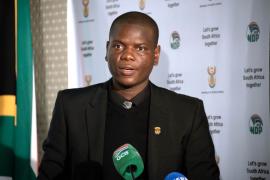
Women disproportionately shoulder the heaviest burdens during times of regional conflict and rising geo-political divisions – a stark reality underscored by Minister of International Relations and Cooperation Ronald Lamola.
The Minister was speaking at the Solidarity Conference on Women, Peace and Security, held in Tshwane, on Friday.
Lamola said the world is currently in a rapidly evolving geo-political environment “defined by rising global competition, changing alliances, contested international norms, economic volatility and escalating geo-political tensions”.
“These deepening geo-political divisions are fuelling mistrust and threatening to undo hard-won progress in addressing global challenges such as poverty, armed conflicts, climate change, pandemics, nuclear proliferation and the rights and wellbeing of women and children.
“In the midst of these constantly changing global dynamics, the world currently faces more than 50 ongoing armed conflicts spanning a wide range of regions and scales. In these conflicts, no region is spared. These conflicts have caused millions of deaths and displacement of refugees, human rights violations and infrastructure destruction.
“In all of this, women bear the heaviest burden as caregivers, as survivors, as protectors of families and communities. But some women are also actively fighting in the field, side by side with men,” the Minister said.
According to United Nations Women, more than 600 million women and girls lived within 50km of conflict zones in 2023 – a rise of some 50% in the past decade.
The international body also reports that the proportion of women killed in conflict doubled in 2023 and more than 3 500 cases of conflict-related sexual violence was recorded.
Lamola said despite the circumstances, women are leaders in their own right and called on the international community to “also listen, learn and follow their lead”.
“But women are not only victims. African women are leaders, mediators, healers and architects of peace. From the townships of South Africa to the highlands of Ethiopia and from the marketplace of the DRC to the refugee camps of Sudan, women are doing the daily, often invisible work of conflict resolution, mending broken social fabric, advocating for justice and demanding a seat at decision making processes.
“African women are pioneering local peace processes, creating community resilience programmes, leading truth and reconciliation efforts and holding armed actors accountable,” he said.
The Minister noted that although much has been done to foster women inclusion in security structures in Africa, “women are not easily found in peace negotiation tables”.
“We cannot talk about Africa’s future without talking about the safety and dignity of African women.
“We cannot dream of unity while half the population is still denied a voice in decisions that shape our collective destiny, and we cannot build peace without those who have always been its most consistent guardians – our mothers, sisters, daughters and grandmothers,” Lamola said. – SAnews.gov.za


